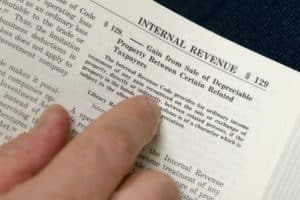Welcome to our page about the IRS Transcript codes for bankrupting taxes. To determine the exact date when you can bankrupt the income or dischargeable portion of a trust tax, you must obtain the tax transcript and review these key codes. The IRS has updated its transcript format to enhance the protection of taxpayer data by masking the full taxpayer identification number. There are some essential codes to know for analyzing when and how to file bankruptcy and discharge income and trust taxes. Also, in this post, you can get information on how to bankrupt income taxes and some helpful IRS transcript forms.
What are the IRS Transcript Codes?
Your IRS account tax transcript lists the IRS transcript codes that show a history of what has happened with your IRS account over the years. These codes summarize the activity in a taxpayer’s account related to their tax returns, including balances due, overpayments, and transaction codes. For example, tax code 846 indicates your refund is being sent. You can download a manual on what the codes are here.
Tax code 826 indicates your tax return is being used to repay an old tax debt. It is a practice that the refund will be paid to your oldest tax debt first. Since you can discharge taxes generally in bankruptcy after three years and the statute of limitations is after ten years, the IRS always pays the oldest tax debt to ensure they collect as much as possible.
Code 570 means your tax return is being held up due to an audit, 1099, which was not included as income, assessment, or another process, which delays your refund until it is cleared up.
Other essential codes in the IRS pocket guide and other code manuals include assessment or audit codes on your IRS tax transcript.
IRS Tax account Transcript Codes for Bankrupting Taxes
Please know that these are not all the tax codes you need to know to understand your IRS tax transcript completely. I also advise you never to trust your memory. Instead, get a copy of the tax transcript and look for the crucial transaction code that triggers tolling, traps, and other problems with the IRS.
Plus, never trust the IRS collector to tell you the truth because he gets his pay from his success in collecting from you. Unfortunately, you will still owe the tax if you make a mistake. We suggest getting your tax transcripts and looking for the codes to avoid this trap if you intend to discharge your income taxes.
Click on this link to download the codes, a 17-page IRS pocket guide. However, please be aware that you don’t need to know every code to evaluate tax transcripts to bankrupt the debt. Be sure to also look for the assessment transaction code, which are the tax transcripts codes that might cause you problems in discharging the income tax.
Important IRS Tax Transcript Codes
• IRS Transaction Codes for Evasion
- 240- 616 Filing a false return
- 240-618 Evasion of tax payment
- 240-646 Willful
- 240-650 Intentional
- 240-668 Fraudulent failure to file
- 240-673 Filing a frivolous return
• IRS Tolling Transaction Codes
- 320 IRS Fraud Code
- 420 IRS Audit Code. TC 420 indicates when a return has been referred to the examination or appeals division.
- 480-XXX All 480 codes are OIC Offer in Compromise codes
- 520 Offer in Compromise, which stops collections
- 520-XXX Pending litigation transaction codes bankruptcy, due process, pending litigation
- 608 IRS Statute of limitation has run code; if the statute has not run yet, look for the CSED date because it runs from the assessment date.
- 900 series tend to be pending IRS criminal actions 910, 914, 916, and 918; these are rarely on the transcript they give to you. Investigators know if you ask for the transcript, they will sanitize it.
Tricks and Traps to Discharging Tax in Bankruptcy
- If you are in no rush, you may want to wait a few extra days more than the calculation to ensure that you age the tax debt for a successful tax return. The calculation uses the date the return was due and business days, so weekends, holidays, and extensions may cause miscalculations.
- Avoid starting a personal war with the collector. They note the file, so more aggressive collections will be used if you threaten or are demeaning to tax department personnel.
What Does a Code 766 Mean?
A code 766 on an IRS transcript indicates an offset reversal. This means that the IRS has detected an error in a previous tax assessment or payment, resulting in an unexpected tax refund or a larger refund due to a child care credit, overpayment, or other error. The code 766 is used to correct the mistake and ensure that the taxpayer receives the correct refund amount.
What Does a Code 766 Means?
766 is the IRS code for an offset reversal. When there is an offset reversal, you have an unexpected tax return check, or the IRS has detected you are due a larger refund due to a child care credit, overpayment, or other error.
How Long Do I Have to Wait for My Tax Refund?
Usually, a tax return only takes 2-4 weeks. Refunds are processed much faster if you allow a refund to be electronically deposited. If they are sent by mail, it may take weeks to arrive, which is less reliable. If your refund takes longer than 4-5 weeks, you may want to look at your account transcript to determine what delays the refund.
How Can the IRS Tax Transcript Codes Help Figure Out What is Happening with Your Tax Refund?
If you are waiting for your tax return, the transaction codes can help determine what delays it. The IRS does not work for you. The main job of anyone you talk to at the IRS is a primary job of debt collection. Calling for an answer may take hours on hold. They rarely tell you how to get the most significant refund, how to get it quickly, or what happened to your refund.
The Integrated Data Retrieval System (IDRS) is the IRS’s electronic system that processes and checks tax returns, including both electronic and paper submissions. A new assessment often causes any delay. Looking at the tax account transcript will usually provide you with information faster than waiting on a letter from the IRS.
If you are audited, the auditor is maximizing your tax liability, and you should never go through an audit without someone to represent you. H&R Block and other places that prepare your return can add audit protection to your return and represent you in an audit.
How Do the IRS Transaction Codes Affect Your Bankruptcy?
Remember that IRS transcript codes are generally not used in your bankruptcy. The judges and trustees will require your IRS returns to see if your petition is accurate. The return will show assets, expenses, and income sources your petition may not have accounted for.
The assessment of additional tax can impact the timing and strategy for filing bankruptcy, as it may extend the period you need to wait before you can discharge tax debt. The IRS transaction codes should be consulted to determine how long you must wait until you can file bankruptcy and discharge tax debt. Filing an offer in compromise, filing bankruptcy, or an assessment will increase the time you have to wait to file.
If you miss the calculation for one day, you will continue to owe income tax year when you didn’t wait long enough to file. If you waited until you were eligible to file, you are allowing the IRS extra time to garnish a bank account or attach real estate. You want to file as soon as possible but not too early. A Tax discharge determinator is a software that helps calculate this date.
Calculating your Collection Statute Expiration Date (CSED)
voluntary
In essence, tax filings not on time are suicide. You become collectible forever by not voluntarily filing your taxes. Even if tax returns are slightly wrong, it is generally better to file them instead of not filing them. On top of everything else, you increase the penalties and interest you will be charged if you don’t file the return on time.
Tax assessments with their own Collection Statute Expiration Date include.
- assessments from amended returns,
- audit assessments, and
- civil penalty assessments.
If the IRS files a substitute for a return, you permanently owe the tax, it generally cannot be discharged in bankruptcy.
What is the Collection Statute Expiration Date (CSED)?
The Collection Statute Expiration Date (CSED) is the deadline for the IRS to collect a tax debt. It is typically 10 years from the date of the original tax assessment. However, the CSED can be extended or suspended due to various events, such as filing for bankruptcy, making an offer in compromise, or being in a payment plan. Understanding the CSED is crucial for taxpayers who want to avoid paying unnecessary penalties and interest.
The IRS’s Time to Collect Can Be Suspended
Several items can extend the initial ten-year CSED, which is generally extended if any act prevents the IRS from collecting. These events are found in the transcript transaction codes and include an offer in compromise and bankruptcy. The time continues to run if you are in a payment plan or you are in currently uncollectible status. The CSED date continues to age if the IRS voluntarily suspends collections.
There is a significant difference between having your CSED suspended and extending it. The time while you are determined to be uncollectible or the time you are making partial payments counts towards the ten years. The IRS itself decides not to collect while you are in a payment plan or decides you are uncollectible.
Events that Extend the CSED Date
Actions such as filing bankruptcy force the IRS to stop collections. When the IRS is forced to stop collections, the time is extended, and the CSED date does not age. The time you are in bankruptcy does not count towards the time you need to age the debt for statute of limitations purposes. The CSED collection period is extended when a statute allows time to be added to the CSED date. These events, such as an offer in compromise, assessment, or bankruptcy, have specific IRS transaction codes that extend the CSED date. You have to closely look at the statute to calculate these times. These periods will have additional periods added so the IRS can set up collections added to these dates.
Are you having a Problem with the Audit Code on IRS Tax Transcript? Contact an Expert Tax Professional to Get Assistance!
It will help if you use a qualified bankruptcy and tax professional who understands tax transcript codes. Many attorneys “file the bankruptcy petition.” But you don’t want to hope the tax is discharged. You never want to miss the date because even one day will be fatal.
Sometimes, you get lucky, and the IRS may not catch that you filed your bankruptcy early. You might think of filing bankruptcy as a chess game where strategy and timing must be perfect to be successful.
I have an experience of more than 35 years in bankruptcy, foreclosures, and successful student loan discharges. I can help you by providing the guidelines and valuable information about IRS transcript codes. It is essential to hire a professional attorney to make an informed decision.
Navigating the Tax Resolution Process
Resolving tax issues can be a complex and time-consuming process. Taxpayers who receive a notice from the IRS may feel overwhelmed and unsure of how to proceed. However, with the right guidance, taxpayers can navigate the tax resolution process and achieve a favorable outcome.
How to Resolve Tax Issues
To resolve tax issues, taxpayers should first understand the type of notice they received and the actions required to resolve the issue. They should also gather all relevant documentation, including tax returns, receipts, and correspondence with the IRS. Taxpayers can then contact the IRS to discuss their options and determine the best course of action. In some cases, taxpayers may need to file an amended return or make a payment to resolve the issue. It is essential to work with a qualified tax professional to ensure that all tax issues are resolved correctly and efficiently.
Conclusion
Summary and Next Steps
Understanding IRS transcript codes and the tax resolution process is crucial for taxpayers who want to avoid penalties and interest. Knowing what each code means and how to navigate the tax resolution process, means taxpayers achieve a favorable outcome and move forward with confidence. If you have tax issues, iwork with a qualified tax professional who can guide you through the process and ensure that all tax issues are resolved correctly and efficiently.
Resources for Bankruptcy
IRS Transcript Codes for Bankrupting Taxes
Chapter 13 and IRS Tax Returns and Refunds in Bankruptcy
How to Sue the IRS in Bankruptcy Court
Do you need help discharging your taxes? Contact my office right away to start the conversation. Nick C. Thompson, Attorney: 502-625-0905






